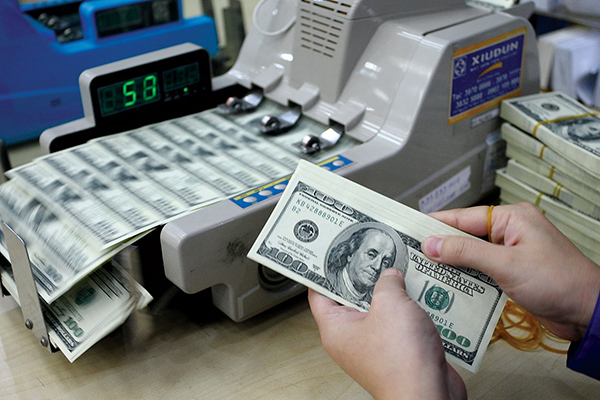The Vietnamese government is taking bold steps to eliminate the dollarization in the economy, prohibiting lenders including commercial banks from providing medium- and long-term foreign currency loans to businesses to pay for imports from October 1 this year.
 Ending foreign currency lending will minimize dollarization in the economy
|
According to the State Bank of Vietnam (SBV), the country’s central bank, the move aims to implement the SBV’s policy to shift the foreign currency-related transactions from borrowing and lending to buying and selling to restrict dollarization in the economy.
With the new regulations, local importers will have to take VND-denominated loans and buy US dollars to serve their offshore payment demand.
Both businesses and commercial banks said they have been making preparations for the time when USD loans would no longer be given.
According to experts, the gradual narrowing of demand for foreign currency loans by the central bank is necessary and consistent with the government's anti-dollarization roadmap.
Ending foreign currency lending will minimize distortion in the foreign exchange market when a series of free trade agreements are implemented.
Banking expert Phan Minh Ngoc said dollar lending makes dollarization of the economy more serious. As more local people use the dollar in daily transactions, the effect of the central bank’s policies would be reduced.
Ngoc took inflation as an example. When inflation is high, the central bank wants to increase interest rates to control it. However, due to dollarization, local people will prefer borrowing in dollars rather than in VND, which means the central bank’s intervention has little effect. This has been seen in some countries with hyper-inflation, where the dollar replaces the local currency while the countries’ central banks are unable to do anything.
Policies support
Previously, dollarization was alarming in the country because of high inflation. Reports showed that the ratio of deposits in foreign currency to the total was over 20%. At that time, businesses and individuals tried to hoard dollars in anticipation of the dollar strengthening in the future. There existed a big gap between the official exchange rate announced by the central bank and the exchange rate in the unofficial market. This put pressure on the official forex market and badly affected the central bank’s exchange rate policy.
But the government’s anti-dollarization campaign has been on the right track as the level of dollarization in the economy has been steadily declining in recent years, experts said. According to the National Finance Supervision Council, outstanding loans in VND amount to some 91.9% of the total.
The financial statements of some banks show the ratio of their foreign currency deposits to total deposits dropped sharply in the first half of this year. In three large state-owned banks, Vietcombank, Vietinbank and BIDV, they slid by US$500 million.
Experts attributed the success in the fight against dollarization to the central bank’s smart policies like paying zero percent interest on dollar deposits and ensuring there is no foreign exchange volatility.
Indeed, the domestic and overseas finance markets have in recent times been volatile, and the VND has been one of only two currencies in the region along with the Thai baht which have not depreciated against the greenback amid the US-China trade war and the relentless depreciation of the Chinese yuan.
The stability of the VND has contributed to decreasing demand for the dollar as people prefer the national currency and deposit it in banks due to a huge spread between interest rates on VND deposits and those of the dollar.
Banks pay nearly 9% on VND deposits while the rate on dollar deposits is zero.
Though the central bank recently cut key interest rates by 0.25 percentage points, deposit interest rates have remained steady. Hanoitimes
Anh Hong
 The stability of the VND has contributed to decreasing demand for the dollar as people prefer the national currency due to the large spread between interest rates on VND and the dollar.
The stability of the VND has contributed to decreasing demand for the dollar as people prefer the national currency due to the large spread between interest rates on VND and the dollar.